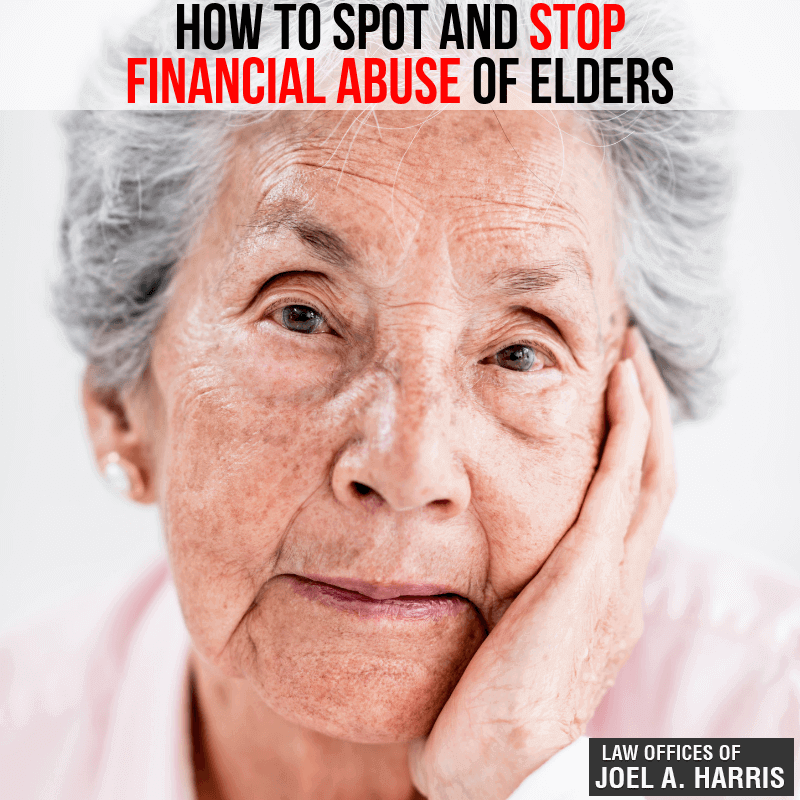How to Spot and Stop Financial Abuse of Elders

A 2016 seniors study found that the average loss to elder financial abuse victims was $36,000. Financial exploitation of seniors has grown significantly over the past decade, spreading further and creating more and more financial adversity. This disastrous financial exploitation can be spotted and stopped if one can recognize the fraud and take steps to protect yourself and your loved ones. The effects of financial exploitation can be debilitating leading to a loss of trust in others, loss of security, depression, fear, inability to provide for long-term care needs, and even loss of primary residence.
Who is Susceptible?
Elder financial abuse is a crime that deprives older adults of their resources and ultimately their independence. Older Americans that may have disabilities or rely on others for help can be susceptible to scams and other fraud. These abuse cases are notoriously difficult to prosecute. In many instances, it may seem as though the senior is willingly (and knowingly) giving their assets away. One immediate red flag is when an older person who was previously engaged and sharp begins to demonstrate a significant lack of recall about important matters. It is important to understand how vulnerable your elderly loved one may be to abuse tactics such as trickery, intimidation, or coercion.
Common Types of Fraud
Scams affect every part of life. The most common types of fraud fall under these categories: banking, bankruptcy, health, housing and mortgage, immigration, telemarketing, telephone, and direct mail marketing. The most popular scams include advance fee scams, chain letters, charity scams, IRS-related scams, Health product scams and tech support scams. With an immense collection of types of scams and frauds, it may be hard to figure out where to report each type. Unfortunately, scams are not limited to people you don’t know. Most of these egregious crimes are unreported and many of the them are committed by family members.
“The effects of financial exploitation can be debilitating with the individual frequently experiencing loss of trust in others, loss of security, depression, fear, inability to provide long term care needs, and loss of primary residence.”
Red Flags
Situations of financial exploitation commonly involve trusted persons in the life of the vulnerable adult such as caretakers, family members, neighbors, and even attorneys. Unfortunately, they look to gain power of attorney or conservatorship and abuse those powers. What are some of the red flags? Some signs include using conservatorship authority to transfer property for the conservator’s benefit, taking advantage of joint bank accounts, using or borrowing property without court authorization, refusing to obtain needed care and medical services for the victim in order to keep the person’s assets available for the abuser, and making unexplained decisions that are not in the best interest of the protected individual. The best approach for this kind of abuse is granting more than one person in a family the power of attorney. Visit an elder law specialist like The Law Offices of Joel A Harris for help. If you don’t have someone you absolutely trust, such as a spouse or child, you should consider co-agents in their power of attorney.
Stopping The Abuse
Interventions to address the financial abuse include closing joint bank accounts, having the victim revoke the power of attorney, and putting in a place a responsible person, a private fiduciary, or bank to assist with managing the victim’s funds. Other effective methods of addressing the financial abuse include working through multi-disciplinary teams which include law enforcement and working closely with banks to recognize, report, and investigate financial abuse.
“One in nine seniors reported being abused, neglected or exploited in the past twelve months.”
One in nine seniors reported being abused, neglected or exploited in the past twelve months. The effects of financial exploitation can be debilitating with the individual frequently experiencing loss of trust in others, loss of security, depression, fear, inability to provide long term care needs, and loss of primary residence. If you notice any of the red flags mentioned, you need to take action to mitigate financial loss and even prevent it entirely. Bennet Blum, MD and a leader in the field, developed an effective model for gauging how susceptible someone may be to undue influence. His “IDEAL” model assess the factors: Isolation, Dependency, Emotional manipulation, Acquiescence, and Loss. The IDEAL model is an important approach to safeguarding clients from those who perpetrate elder abuse.
Report the abuse – contact the appropriate financial institutions based on the type of fraud to prevent unauthorized transactions. If the report is towards a close relative of the elder, confront the perpetrator and get the proper authorities involved. Theft should be reported to law enforcement officials, and Adult Protective Services in your state or your local police can help. You can also make reports to the Federal Trade Commission for more of the common scams and fraud. Engage an aging life care professional or geriatric care manager who can offer support, guidance, access to resources, and compassion. Choose your trusted advisors wisely and be sure to conduct due diligence for anyone who is counseling, or caring for, your elderly loved one. Lastly, confirm that your loved one’s accounts are protected by the appropriate safeguards so that their personal and financial information stays secure. Equifax, one of the three major credit reporting agencies in the U.S., offers a free credit monitoring service, TrustedIDPremier. With that you are able to monitor and report any suspicious activity on your credit report. Remember, never give your social security number, account numbers or personal financial information over the phone unless you initiated the call.
“Choose your trusted advisors wisely and be sure to conduct due diligence for anyone who is counseling, or caring for, your elderly loved one.”
Are You Worried about Your Assets After Your Passing?
If you are not properly protected you and your loved one’s life savings could be taken away through innumerable and intricate scams. Avoiding and putting a stop to elder abuse also requires planning for your future and protecting your assets. At The Law Offices of Joel A Harris located in Antioch, California, we have worked for over 25 years giving the best guidance our clients need to protect their assets. Have a question? Feel free to schedule a sit-down meeting where we are happy to patiently answer every question you may have. For your free consultation feel free to reach out to us at (925) 757-4605.
Sources
- https://www.livhome.com/blog/stop-financial-abuse-elders/
- https://www.usa.gov/stop-scams-frauds
- http://www.napsa-now.org/policy-advocacy/exploitation/
- https://www.forbes.com/sites/johnwasik/2018/03/30/5-ways-to-spot-and-stop-elder-financial-abuse/#3dd742706eff
- https://www.aarp.org/money/scams-fraud/info-2015/how-to-spot-early-warning-signs-of-elder-financial-abuse.html
- https://www.aba.com/Consumers/Pages/ProtectingTheElderly.aspx#





